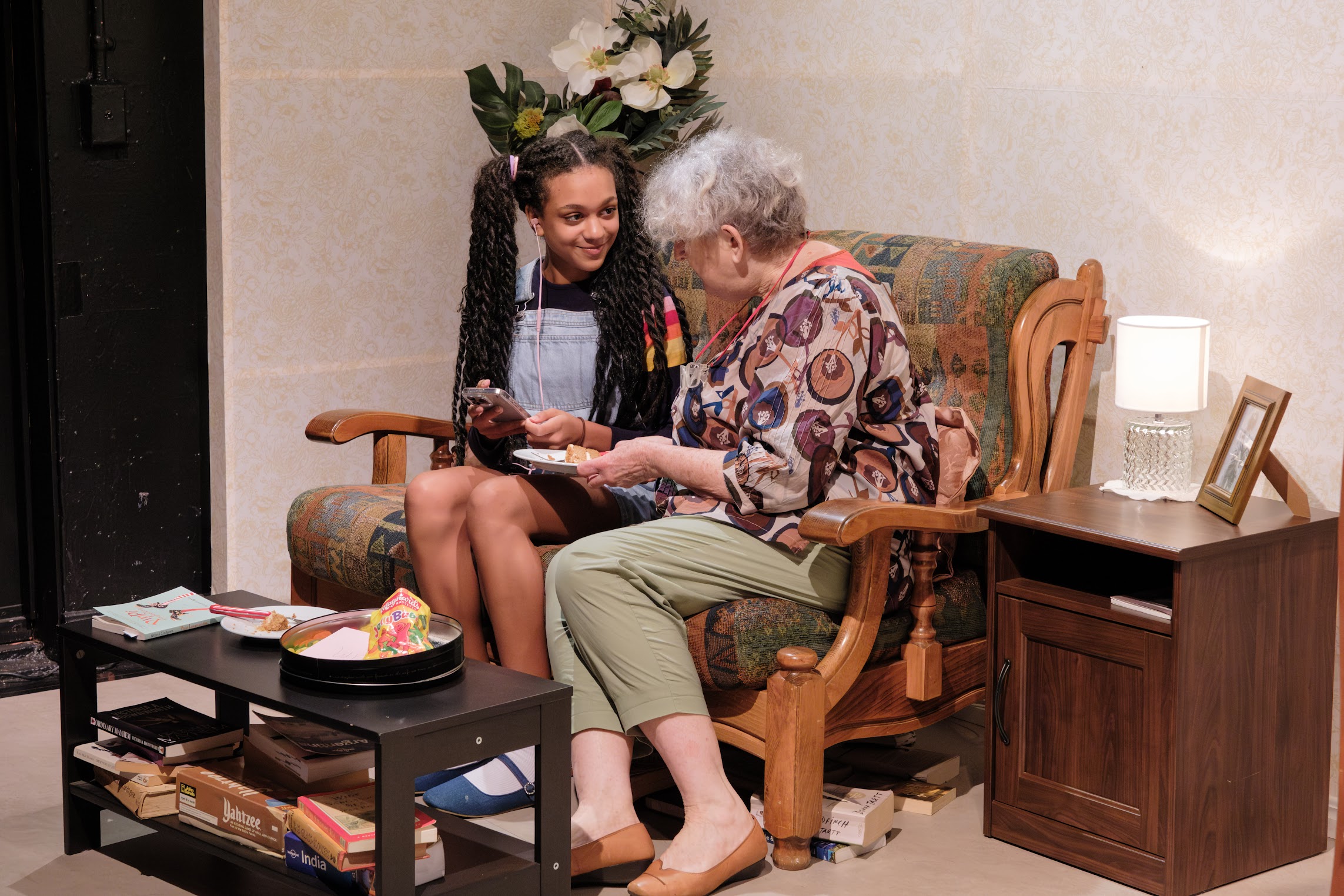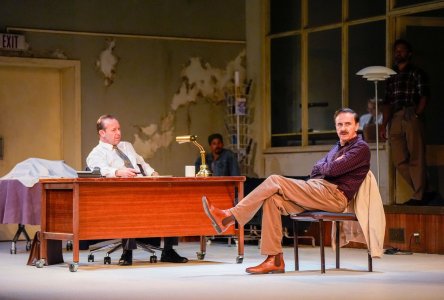
BETRAYAL
BETRAYAL, Ensemble Theatre, 21 July-20 August 2016. Photography by Clare Hawley: above - Guy Edmonds and Matt Zeremes; right: Ursula Mills and Matt Zeremes
“The Pinter pause” has become one of the most fetishised and (in)famous silences in modern theatre. It is often encountered in the English master’s plays – 140 times in Betrayal alone – and is one of the most studied, revered, feared and argued over theatrical instructions of the 20th and now 21st centuries, and yet [PAUSE]
Harold Pinter himself urged actors and directors to cut them “if they don’t make sense” and also said, “When I myself act in my own plays, which I have occasionally, I’ve cut half of them, actually.” So, the sparkling pace and enticing rhythm of director Mark Kilmurry’s new production of the 1978 work suggests a count of the pauses in it would be well down on the original. And all to the good.
Betrayal is Pinter’s acknowledged semi-autobiographical exploration of his long love affair with Joan Bakewell, a well known highbrow TV presenter. Now an elder stateswoman of British life, she was then, in the unthinking machismo of the day, nicknamed “the thinking man’s crumpet”. She was not only gorgeous but also immensely smart and intense – think an arts and culture version of Leigh Sales.
Pinter was also great friends with Bakewell’s husband Michael, a radio producer with whom the playwright also worked. It was an emotional tangle of epic proportions whose repercussions went on for years, not least on the day a package was delivered to Bakewell from her by then ex-lover – and close friend – Pinter. It was the script of Betrayal and, as he did with all his new work and closest friends, he wanted her (positive) opinion.
What is astonishing – today as it was in 1978 – is to see baldly portrayed in the play how furious (and betrayed!) Pinter clearly felt when he discovered Bakewell had told her husband of their clandestine affair some years before, but had not told Pinter she had told her [PAUSE] well you get the picture.
Not surprisingly, Bakewell wasn’t keen on the title but the playwright was adamant that it was not directed at her but at the possibilities of all kinds of betrayal. Whether the gentleman protesteth too much we will never know as he died in 2008. Meanwhile Bakewell’s own account of the relationship was published earlier this year in Stop The Clocks: Thoughts On What I Leave Behind (Virago).
In the memoir she observes, “When the truth emerged that Michael knew, Harold felt betrayed by my treachery in not telling him what had happened.” She called it “a moral cat’s cradle” which is how we see it in the play – electrifying theatre in Bakewell’s words – but also breathtakingly hypocritical on Pinter’s part and, in the context of the play, damned funny.
Also interesting, from a theatrical point of view, is that Betrayal begins at the end and then goes back to the beginning. The opening scene is set in a pub where the ex-lovers meet for a drink a couple of years after the end of their affair. Emma (Ursula Mills) and literary agent Jerry (Matthew Zeremes) sip from the first of many glasses as they awkwardly attempt to bridge the chasm that’s opened up between them.

On the chilly, mostly pale grey and white set (Anna Gardiner with lighting by Christopher Page) this distance is physical: contact between minds and bodies is at first minimal. When the scene later changes to the flat the lovers once rented for their secret afternoons, nothing needs to be done to indicate how impersonal and unlived in it is.
The fire in this icy melange is provided by book publisher Robert (Guy Edmonds) whose affability and charm covers an inner core of bubbling anger and suppressed violence. When combined – even surreptitiously – with guilt and lies, it’s a volatile mix and Robert’s habit of heartily smacking his fist into his open palm to make a point is a potent and unlikely companion to the repeated question “and how are you?” that is asked by each of the trio almost as a nervous tic to fill silences.
Guy Edmonds is tremendous as the cuckold-serial philanderer (yes, that too) and his righteous indignation is both comical and troubling as it escalates. Matthew Zeremes is the ostensibly milder-mannered Gerry but the passive aggression of his affability is almost as disturbing. These are powerful three-dimensional portraits of modern, urbane men politely tussling over a bone: Emma, the woman in their lives.
Emma is a tricky character – she is at once protagonist and antagonist and also a woman of her times: the generation for whom The Female Eunuch had been written and the power of which was only just beginning to make an impact on female lives and thinking. Ursula Mills is coolly elegant and has command of the nuances of the role but is possibly too young to entirely convince. It’s also not helpful that she takes on the tiny role late in the piece of “the waiter” – fetching and carrying in a little pinny – and is therefore also made less than the two men. As I said: tricky.
Nevertheless, the energy and intensity of the language – spare and punctuated with the seemingly natural moments of uncertainty and fluidity – is still potent. The story the play tells has lost none of its intrigue and in this production, the comedy bubbles up and overflows into the audience.
Running at 90 minutes straight through, Betrayal is demonstrably a modern classic and ought to be seen by anyone who is interested in theatre and the intricacies of human relations – and a good chuckle. In other words: most everyone. Recommended.
Comments
Leave a Comment
Enter your username and password to comment. Don't have a username? Register now.




Be the first to leave a comment below